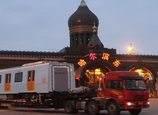
"I don't have confidence inthe A-share market at all," said Zhang Chengbao, an investor with more than 10 years' experience in stock trading. Zhang said that he had lost 150,000 yuan on A shares this year, or a quarter of his total investment.
As of Wednesday, about 84 percent of investors said they have lost money in the A-share market since early this year, according to sina.com's online survey among 64,703 stock investors.
China's A-share market tends to protect the interests of the listed companies more than those of investors, Li Daxiao, director of the Yingda Securities Research Institute, told the Global Times.
Despite a weak market, more than 800 companies are still waiting to be listed, hoping to sell at irrationally high prices to investors, Li said, arguing that high IPO prices hurt the interests of small investors.
"The key for investors regaining confidence is to let them make money," he told the Global Times, adding that tax cuts on trading and capital gains as well as lowering the IPO price will be helpful to boost the market.
The China Securities Regulatory Commission has launched a series of reforms such as encouraging dividends sharing and improving ways for companies to de-list.
The stock market is bottoming out, economist Cheng Siwei said at a forum Wednesday, saying that the government should not interfere with the stock market, and the key is to ensure the quality of the listed companies in the stock market.
The A-share market rebounded in 2009 following the government's 4 trillion yuan stimulus package, soaring about 80 percent from the end of 2008. Since then the market has been very volatile, and started to head south after October 2010 when the government tightened the monetary policy to fight inflation.















 Detective-Conan-themed Lawson convenience store opens in Shanghai
Detective-Conan-themed Lawson convenience store opens in Shanghai


![]()
